- Home
- Aaron Allston
Sidhe-Devil Page 3
Sidhe-Devil Read online
Page 3
Gaby shook her head. "Our real apartment is here. Nice high-rise on the west side of the park."
Zeb glared. "How long have you been living in New York? And why didn't you tell me you were back?"
"We don't live in New York," Harris said. "So, technically, we're not back. We just have an apartment here. Again—how did you find us?"
"By giving up. My flight back home was tonight, remember? I gave up figuring out how or why you'd ditched me, headed to the airport to catch my flight, and spotted you at one of the gates. I thought about jumping on you right then and there, but I figured you'd have a harder time lying to me or ditching me again if I met you here. I checked and found out my plane would be arriving sooner—"
Gaby made a rueful face. "We couldn't get a direct flight at the last minute. Couldn't even get first class."
"So I just got here and waited."
"We should have just gone with him and helped him pack," Gaby said, her voice resigned.
Harris grinned. "Then you could have stared at him changing the way he was staring at you."
"Zeb! You weren't." She laughed.
"I wasn't! Okay, maybe a little. Get back to the point. Where are we going, and what are you up to?"
"Okay." Harris gave him an ingenuous look. "Here's the short form. For the last six months, we've been living on another planet." He put his index finger up to his forehead and wiggled it to suggest an antenna. "We come back to visit occasionally, but we really live there, and we shoot things for a living. Like monsters and fairies with machine guns."
"We solve problems for a living," Gaby corrected. "Which, to be truthful, sometimes does involve shooting things."
"It's a dangerous job, and we don't like to drag other people into it. But some of the trouble has obviously spilled out into this world. Those guys at the wedding were from the other world, and we need to find out, fast, why they were here."
"So we're going back, tonight," Gaby said. "We're going to step in a magic circle and disappear, and, poof, reappear in the same place on the other world." She gave him a smile. "Add it up, Zeb. Another planet."
"Monsters," Harris said.
"Magic circles."
"Monnnsters."
"We're crazy, Zeb."
Zeb fell silent, the brooding anger on his face suggesting that he didn't want to talk about it just yet. Harris and Gaby left him in his silence until they were outside, until they were in a cab headed toward Manhattan.
"I'm going to go there with you," Zeb said.
"No, no, no," Harris said. "Your line is, `Harris, this is complete bullshit. I don't want to talk to you for a while.' And then we drop you off at home."
"But it's not bullshit, is it? I looked at those guns. I didn't recognize the caliber of ammunition. I know a fair amount about ammunition. One of those revolvers was a break-loader—as Gaby said, like the original Webleys. Large-caliber break-loaders are pretty rare, and I don't remember seeing any like that one before. Then there's that thing the old guy threw at me. That was no high-tech net weapon." He sighed. "Most of what you told me might be lies . . . but you are playing around with weird people using weird stuff. And I'm going with you so I can see the rest of it."
Harris said, "Not a good idea. It's a dangerous place, Zeb, especially if you don't know your way around."
"Harris, I'll just bet that when you went there, you didn't know your way around. And if I remember right, you weren't in the best of mental shape six months ago."
"That's right. I was depressed, I was a loser and didn't know why, and my brain just wasn't firing on all cylinders. But I fell in with the kind of people who could keep me alive while I learned the ropes."
"Well, you know the ropes now, and I'll be with you."
Harris shook his head. "Zeb, once upon a time I might have taken you across just so I could prove my story to you. But I'm not that insecure any more, and I'm not going to risk your life just so you'll believe me."
Zeb grinned at him. "Your brain still isn't firing right. Harris, I already do believe you. That is, I believe that either you're telling the truth, or you're covering up for something equally unlikely. I don't want to see it to assure myself that you're not crazy—I just want to see it. I mean, what an incredible thing! Like discovering a lost city from the Bible, except it's still full of people. It'll make the universe twice as big for me."
Gaby and Harris looked at one another again. Zeb wondered if they were somehow exchanging thoughts, but then he saw Gaby's faint nod.
Harris turned back to him, considering something; then he collapsed in silent laughter.
"What's with him?" Zeb asked.
Gaby shrugged. "Beats me."
Harris wiped his eyes. "Sorry, Zeb. I was going to give you the primer on life on the fair world. That's what they call where we're going. And the first thing I was going to tell you was that on the fair world, the duskies don't have all the advantages or respect of the lights and darks, so you're probably going to meet people who'll be nasty to you on account of your color . . . I was going to introduce this concept to you, see . . ."
Zeb gave him a pitying look. "Gaby, is there any place in town where we can buy this guy a clue?"
* * *
Zeb looked around. A twentieth-floor apartment, new furniture, framed prints on the walls, a glorious balcony view of nighttime Central Park immediately to the east. He whistled. "This must set you back a ton of money."
Harris unzipped his duffel bag and poured its contents out on the couch. "Yep. But we make plenty. We actually get paid in gold, which is pretty cool." He grabbed the roll of black rubber; it gave a little wiggle and resumed its faint yammering.
"You couldn't get back to the `fair world' from L.A.? That would have been more convenient, wouldn't it?"
"No. We don't have a transference circle there. We could have set one up there if we'd known we were going to head right back to the fair world. But we were going on our honeymoon first."
Gaby, from inside the study, called, "Our now abandoned honeymoon. Are you going to help me with this?"
"Well, it was a second honeymoon anyway." Harris headed into the study.
Zeb followed. The study had a wood floor. Gaby stood on the large rug that dominated the center of the floor. Together she and Harris moved the table to the corner, off the rug.
"Second honeymoon?"
Gaby knelt to begin rolling up the rug. "We were actually married months ago in Neckerdam. That's the fair world's New York City. The L.A. wedding was for the families."
"So they'd shut the hell up," Harris said, his voice a growl.
"Well, they didn't want us to live in sin."
"Why not? I liked it. There's a lot of fun in sin."
"Harris, we have company."
Beneath the rug was a design painted on the floor. It consisted of two concentric rings of white paint; between them was a series of white symbols Zeb didn't recognize, markings that looked like half-finished stick people. Gaby and Harris bent, noses almost to the floor, and minutely examined the white circles all the way around.
"No breaks, no changes," Gaby said.
"Same here," Harris said. He dropped the black thing within the inner circle and then, from a cabinet, picked up something that looked like an ancient TV set: a carved wooden case that would have looked at home in Zeb's great-grandmother's attic, with a small, circular glass screen in the middle of it. Harris set it down in the middle of the circle and plugged it into an electrical socket that, incongruously, was set into the floor there. A pinpoint of light appeared at the center of the screen and began growing.
Gaby knelt in front of the set, put her hands on it, shut her eyes.
"What's she doing?" Zeb whispered.
Harris said, "She's projecting her mind into the Grid. Sort of like she had a direct brain-to-phone link to the fair world's Ma Bell and entertainment networks."
"Ah. You didn't mention you'd also become superheroes."
"Slipped my mind." Harris kept h
is attention on Gaby. "Doing this from here is very hard for her, so let's be quiet."
After a minute of concentration, Gaby tilted her head. Static burst from the TV's speaker. She frowned, concentrating, and the static began to ebb and flow, almost as though it were the voice of some roaring beast of the airwaves. Zeb saw her mouthing words she did not speak.
Then she stopped and switched the set off. "Bad connection," she said. "But I got hold of Noriko. She and Alastair are coming to pick us up; he'll trip the circle in two chimes. She says Doc is missing and Ish is beside herself. Let's get ready."
"Right." Harris frowned. "Doc is missing. Gaby, if they were coming to grab us, why did they bring only one of those rubber grabby things?"
She shook her head. "Because they only wanted one of us?"
"Maybe. Or maybe they weren't after us. Maybe they were after Doc, figuring that he'd be at the wedding. Maybe they had two groups, and one of them got him back home."
Gaby's expression suggested that she didn't care for that idea.
Harris pulled out the contents of his pants pockets, set everything on the table. "Zeb, get rid of your wristwatch, put it here with my stuff. What've you got in your pockets?"
"Uh, loose change, keys, a pen, my wallet—"
"Dead weight, most of it. Dump it here. You can keep your pen if it's a fountain pen, otherwise chuck it."
Zeb obliged, then patted himself down. "I feel naked without my stuff. Why leave it?"
"We go through sort of a filter getting there. It mangles anything that's too, well, technologically advanced for the fair world. Anything too mystically advanced gets wrecked on the way back." He grinned. "You haven't had a pacemaker installed recently? That would be bad."
"Get real." Zeb frowned. "Wait a second. If this filter wrecks mystical things, what about the rubber-sheet guy?"
Gaby said, "What Harris forgot to mention is that the filter is down for repairs."
"Yeah, but it could come up again at any time." Harris offered him an expression suggesting that one can't count on anything. "A bad guy named Duncan Blackletter cut the bonds holding the two worlds together. That also cut the filter and made it even trickier to go from world to world—it takes the most expert of the experts to set up the transference circles now. But the bonds are growing back together, and presumably the filter—we just don't know when it'll start up again."
Zeb gave him the sort of smile he normally reserved for small children. "Whether it's true or not, you know how this sounds."
"You can leave anytime."
"Nope."
"Then strip, soldier."
They dressed from a chest full of clothes that, to Zeb's eye, looked like well-preserved antiques. The men put on high-waisted suits with suspenders; Zeb's was brown with a matching vest, while Harris's was a two-piece green so dark it was almost black. Gaby returned in a painfully bright yellow skirt and blouse with a matching wide-brimmed felt hat.
"So, these museum pieces are what everyone's wearing?"
"You got it," Harris said. "How's it fit?"
"A little loose. You're gaining weight."
"I'm just broadening in the chest. That's what Gaby says."
"Yeah, but she has to put up with you. Hey, is that a fedora?"
Harris handed the hat to him. "Yeah, but on the fair world it's a merry, or merry-hat. Named after someone in a play."
Zeb tried it on, cocked it at a rakish angle. "Always wanted one of these. How does it look?"
Gaby said, "Great. But you two need to stop playing dress-up. We don't have much time."
"Right," Harris said. "Zeb, it's not certain how long we'll be gone. Do you need to make any arrangements?"
"Yeah, I'd better phone my partner. Ask him to deal with my apartment."
"Pets?"
"No pets."
A couple of minutes later, phone calls done, the three of them stood within the two white circles. Zeb looked at the other two, saw only a little concern, a little impatience. And for a moment the oddness of the situation got to him; he suddenly knew that his friends were playing him for a fool, that everything they'd said until now was part of an elaborate practical joke, that a roomful of people he knew would burst in through a side door with cameras and beer bottles.
He shoved those feelings aside. His gut told him otherwise, and when his gut and his brain disagreed, he tended to side with the former.
Then the world writhed around him.
It was as though the air outside the white circles had suddenly become a magnifying glass, distorting everything beyond, twisting the world into something huge and frightening. The twisting seemed to extend right into Zeb's stomach, bending him over with nausea, and continued as Zeb lost his balance and awkwardly sat down. The room around them flowed, the hardwood floor dropping away, the furniture fading into nothingness, the window becoming a wall covered in paisley wallpaper, two giant silhouettes standing before them. Then it all twisted its way back to more reasonable proportions.
"Oh, God." Zeb tried to control his stomach, which insisted that it needed to deposit his airplane meal on the floor.
On the tabletop, actually. Zeb found that he was lying atop a large, sturdy wooden dining table.
Harris said, "You get used to it." He hopped down and helped Zeb to slide off to stand, then turned to help Gaby down.
The room had somehow changed, too. It was larger, with a much higher ceiling than Gaby's and Harris's study. The furniture consisted of hardwood chairs and a wooden bench against the window. The table where the three of them had appeared had a circular top painted with the identical twin of the circle design from the study. Beside it stood a man and a woman.
The man was of average height and a little overweight; his features were cheerful and appeared European, but his skin was a nut-brown that no tan, natural or artificial, could produce; together they suggested someone from India, but then Zeb saw his eyes, which were a startling green. The man's trench coat gapped to reveal a stiff-starched white shirt and pants that reminded Zeb of old doctor movies.
The woman was short and very slender, with Asian coloration and features. She wore a black silk pantsuit with flowing sleeves and legs. In her hands she held a sheathed sword Zeb would have identified as a Japanese katana if it had been curved, but it was ruler-straight. She was beautiful as the statue of a goddess suddenly come to life, but also as expressionless. She stared at Zeb with no emotion on her face, but he saw tension, suspicion in the stiffness of her body language.
"Quick introductions," Gaby said. "This is Zeb Watson; he manages fighters like Harris. This is Doctor Alastair Kornbock, the finest physician who ever slung a submachine gun, and Noriko Nomura Lamignac, princess—at least for the next few days—of the kingdom of Acadia."
"Glad to meet you," said Zeb. He leaned back against the table. His stomach still felt as though it were the midway point in a phantom Ping-Pong match. "Doctor, have you got a stomach powder?"
Alastair chuckled. "Yes. But wait a few ticks and the sensation will pass anyway, so I'd be out a stomach powder for nothing. Grace on you." His accent was not Indian—to Zeb, it sounded more English than anything.
"Grace upon you," Noriko echoed. "Harris, why have you brought him?"
"Some bullies came and I was scared, but Zeb came and beat them up, and now he's my friend forever. No, it's a long story. We'll talk about it in the car." He handed Alastair the rolled-up rubber thing. "See what you can make of this."
* * *
A cage-style elevator with ornately worked bars took them down. The skill and style of the hallway woodwork they descended past, visible even in the dim light of single naked bulbs, reminded Zeb of his long-dead grandmother's brownstone apartment building . . . but this building was in much better shape, much newer. He gulped a few more times and took a deep breath; his nausea was almost gone, as the doctor had predicted. But as the unreality of his surroundings hit him, he almost wished he had the nausea back to distract him. He tried to figure out some w
ay this could have been staged, but making him ill and then swapping his surroundings would have required the use of drugs . . . and Zeb couldn't imagine Harris drugging him for a practical joke.
Yet despite everything Harris and Gaby had told him, despite the fact that he had logically accepted part of their story, he found he wasn't really prepared for it to be true. Accepting it as a working hypothesis had been one thing. But seeing that he was descending a very different building from the one he'd ascended less than an hour before hit him hard. He took in every detail of the elevator, of the floors he saw passing outside the cage door, trying to assure himself that he could not be making a mistake, could not simply have missed these details when arriving at Harris's and Gaby's building.
The lobby had a lower ceiling and darker wall paneling than the lobby by which he'd entered the building. Its doors were open to the outside and the nighttime air was cool, autumn weather New York should have been experiencing this year but hadn't yet. They emerged from the lobby facing a broad brick street with a tree-lined median.
Beside the near curb sat a car, a massive roadster like many Zeb had seen at an automobile show featuring cars of the 1930s, all sleek boxiness with a hood long and broad enough to contain a modern compact car. The vehicle was black and gold, with a gold hood ornament shaped like a flying dragon. It was parked the wrong way, oriented leftward.
A woman stepped out of the rear passenger compartment and held the door open for the new arrivals. She was tiny and well-muscled, with raven-black hair that fell to the small of her back. Incongruously, she wore faded khaki shorts and shirt and a banded hat that reminded Zeb of Australian hunting wear. Around her neck was a gold-brown scarf decorated with jaguar spots.
"Ixyail del Valle," said Harris, "princess of the Hu'unal people, meet Zeb Watson, fighter and manager of fighters." He ducked into the passenger compartment, Gaby behind him.
"Hi," Zeb said, and followed.

 Terminator 3--Terminator Hunt
Terminator 3--Terminator Hunt Mercy Kil
Mercy Kil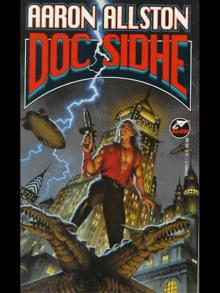 Doc Sidhe
Doc Sidhe Star Wars: Fate of the Jedi: Outcast
Star Wars: Fate of the Jedi: Outcast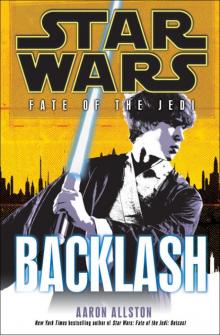 Fate of the Jedi: Backlash
Fate of the Jedi: Backlash Mercy Kill
Mercy Kill Rebel Stand
Rebel Stand Wraith Squadron
Wraith Squadron Star Wars: X-Wing VII: Solo Command
Star Wars: X-Wing VII: Solo Command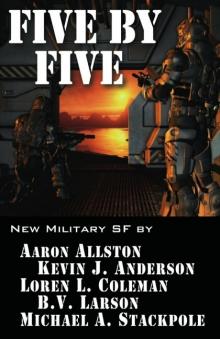 Five by Five
Five by Five Solo Command
Solo Command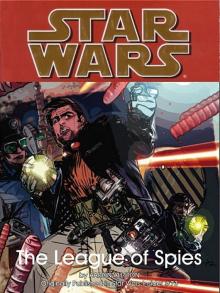 Star Wars: The Clone Wars Short Stories: The League of Spies
Star Wars: The Clone Wars Short Stories: The League of Spies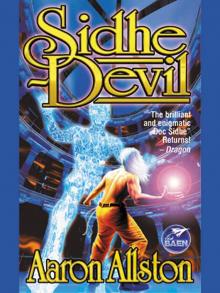 Sidhe-Devil
Sidhe-Devil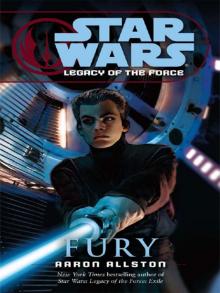 Star Wars: Legacy of the Force: Fury
Star Wars: Legacy of the Force: Fury Starfighters of Adumar
Starfighters of Adumar Star Wars: X-Wing VI: Iron Fist
Star Wars: X-Wing VI: Iron Fist Star Wars - X-Wing - Iron Fist
Star Wars - X-Wing - Iron Fist Exile
Exile Star Wars: X-Wing V: Wraith Squadron
Star Wars: X-Wing V: Wraith Squadron Star Wars - X-Wing - Starfighters of Adumar
Star Wars - X-Wing - Starfighters of Adumar Rebel Stand: Enemy Lines II
Rebel Stand: Enemy Lines II Rebel Dream: Enemy Lines I
Rebel Dream: Enemy Lines I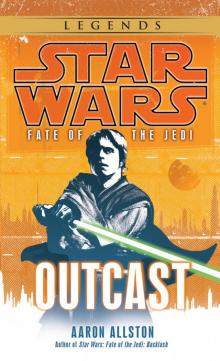 Outcast
Outcast Star Wars - X-Wing 07 - Solo Command
Star Wars - X-Wing 07 - Solo Command